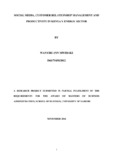| dc.description.abstract | Social media has transformed how businesses work. Businesses can now access more resources thereby increasing its value, creating new partnerships and improving interactions with its customers and suppliers. Nevertheless, social media use for customer involvement challenges the traditional customer relationship management (CRM). With the adoption of social media customers are now controlling the conversation which can destroy the marketing, sales and customer service efforts of businesses. This has resulted in social customer relationship management (SCRM). Social media has become common in the workplace with employees are using social media in the office. The objective of this study is to examine the role of social media in customer relationship management as well as the role of social media on employee productivity in Kenya’s energy sector. The study targeted ICT and customer service staff. Data was collected was collected by use of questionnaires. Descriptive statistics (frequencies and percentages) was then used to organize the research findings. From the findings, the study concludes that social media has a positive effect on customer relationship management. The study also concludes that social media encourages knowledge and knowledge sharing, helps employees achieve their targets and perform their day-to-day operations in a timely manner, contributes to an organizations profitability and does not lower employee productivity or impact negatively on the organization by being addictive. It is recommended that organizations in Kenya’s energy sector adopt social media as a tool for customer relationship management so as to improve the organizations work processes, improve customer relationships, improve products and services through customer feedback, increase profits and reduce advertising and marketing costs. It is also recommended that employees in Kenya’s energy sector should adopt social media use in the workplace for knowledge and information sharing and to help them perform their day-to-day activities and achieve their targets within the budgeted cost and time. Lastly, it is recommended that policy regulators and the Human Resource department should create policies, procedures and security measures for social media use within the organization to avoid misuse of social media in the workplace as well as mitigating against security risks. | en_US |



